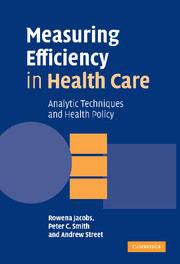Book contents
- Frontmatter
- Contents
- List of figures
- List of tables
- Preface
- Acknowledgements
- List of abbreviations
- 1 Efficiency in health care
- 2 The components of an efficiency model
- 3 Stochastic frontier analysis of cross-sectional data
- 4 Stochastic frontier analysis of panel data
- 5 Data envelopment analysis
- 6 The Malmquist index
- 7 A comparison of SFA and DEA
- 8 Unresolved issues and challenges in efficiency measurement
- 9 Some alternative approaches to measuring performance
- 10 Conclusions
- Appendix: Data description
- References
- Author index
- Subject index
1 - Efficiency in health care
Published online by Cambridge University Press: 10 December 2009
- Frontmatter
- Contents
- List of figures
- List of tables
- Preface
- Acknowledgements
- List of abbreviations
- 1 Efficiency in health care
- 2 The components of an efficiency model
- 3 Stochastic frontier analysis of cross-sectional data
- 4 Stochastic frontier analysis of panel data
- 5 Data envelopment analysis
- 6 The Malmquist index
- 7 A comparison of SFA and DEA
- 8 Unresolved issues and challenges in efficiency measurement
- 9 Some alternative approaches to measuring performance
- 10 Conclusions
- Appendix: Data description
- References
- Author index
- Subject index
Summary
Introduction
The pursuit of efficiency has become a central objective of policy makers within most health systems. The reasons are manifest. In developed countries, expenditure on health care amounts to a sizeable proportion of gross domestic product. Policy makers need to be assured that such expenditure is in line with citizens' preferences, particularly when many sources of finance, such as tax revenues, are under acute pressure. On the supply side, health technologies are changing rapidly, and the pressures to introduce new technologies are often irresistible, even when there is uncertainty about cost-effectiveness. On the demand side, aging populations pose challenges for the design of health systems, and expectations are becoming ever more challenging. Finally, the revolution in information systems has made it feasible to measure aspects of system behaviour – most notably clinical activity – that until recently defied meaningful quantification.
The international concern was crystallised in the World Health Report 2000 produced by the World Health Organization, which was devoted to the determinants and measurement of health system efficiency (World Health Organization 2000). The report stimulated a wide-ranging international debate, and a great deal of controversy (Williams 2001; Anand et al. 2002). However, its enduring legacy may be that it has helped policy makers to focus on the objectives of their health systems, on how achievement might be measured, and on whether resources are being deployed efficiently.
- Type
- Chapter
- Information
- Measuring Efficiency in Health CareAnalytic Techniques and Health Policy, pp. 1 - 16Publisher: Cambridge University PressPrint publication year: 2006



